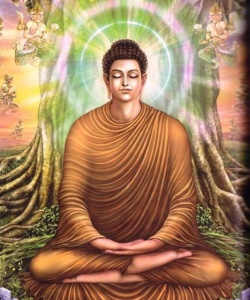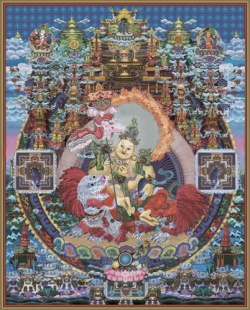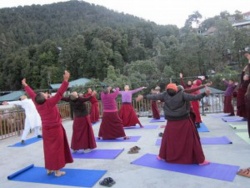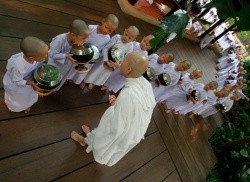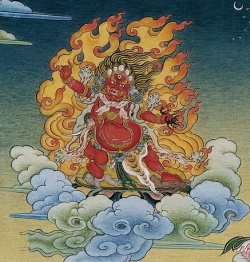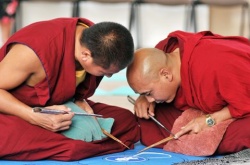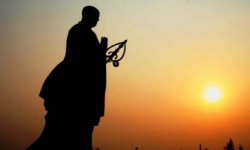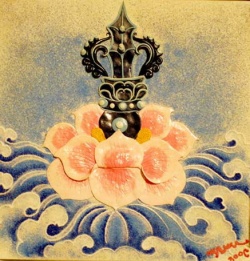Dharma talk: White Universe
Dharma Talk:
White Universe
by Tripitaka Master Hsuan Hua
Ice in the sky, snow on the ground.
Numberless tiny bugs die in the cold or sleep in hibernation.
In the midst of stillness you should contemplate,
and within movement you should investigate.
Dragons spar and tigers wrestle in continual playful sport;
Ghosts cry and spirits wail, their illusory transformations strange.
Ultimate truth transcends words;
Not thought about or talked about, you ought to advance with haste.
With great and small destroyed, with no inside or out,
It pervades every mote of dust and encompasses the Dharma Realm,
Complete, whole, and perfectly fused, interpenetrating without obstruction.
With two clenched fists, shatter the covering of empty space.
In one mouthful swallow the source of seas of Buddhalands.
With great compassion rescue all,
Sparing no blood or sweat, and never pause to rest!
Do you know what I want to tell you all today? I want to tell you about the "Six-Syllable Great Bright Mantra" Recitation Session held at Gold Mountain Monastery in 1972. That session lasted for seven days and seven nights. There were over sixty participants, Americans as well as Chinese. They were all very vigorous, reciting day and night without ever stopping to rest. From morning to night, twenty-four hours a day, every day, they rotated shifts to recite this "Six-Syllable Great Bright Mantra" without resting, stopping, or cutting corners. Why did they do it? They were praying for world peace; they wanted to invisibly eradicate the calamities of the world. That was why this Dharma session was held. In 1974, it was predicted that there would be an earthquake in San Francisco. We recited the "Six-Syllable Great Bright Mantra" to prevent the quake from occurring. That's how we fought with the celestial demons. The celestial demons and externalists wanted San Francisco to quake, and we wanted to turn it around. Therefore everyone was reciting very vigorously, and no one was lazy.
You all know the Six-Syllable Great Bright Mantra. Some people recite "An Ma Ni Ba Mi Hung" while others recite "Om Mani Padme Hum." Long ago there was an elderly woman who recited "Om Mani Padme Cow." Whether it's "cow" or "Hum," it counts as long as you recite it with sincerity. If you are sincere then it will be efficacious; if you are not sincere then it will not be efficacious. What is sincerity? Concentration. Being concentrated is efficacious. Being scattered is useless.
I didn't take part in that session for reciting the Great Bright Mantra. Why not? Because I wanted to let the participants follow their own free will. If I had pressured them into reciting, they would have been embarrassed not to recite. Then it would not really be them reciting, nor would it be me reciting. The recitation would have been done under pressure. That's why I chose not to take part in the session. But I watched them from behind the scenes. I had a "radar" and I could see very clearly who was sleeping and who was not. I was very pleased to find that during the seven days, both during the day and at night, not a single person fell asleep while reciting the mantra. It makes me happiest to see people cultivating. What I dislike most is to see people cheating each other and not cultivating.
During those seven days, every person was very vigorous and diligent. Some of them had attained an ineffably sublime level of skill, while others were feeling terribly tired. Some people were hoping to obtain spiritual penetrations, while others were reciting in the hope of obtaining ghost penetrations or human penetrations. But in the end, they didn't penetrate a single penetration; they were without spiritual penetrations and ghost penetrations and didn't even have the penetrations of people!
After the seven-day session was over, their sincerity in reciting the mantra inspired me to compose the poem "White Universe" as a commemoration. This poem is modeled after the poem "Crimson River" by Yue Wumu [the famous General Yue Fei of the Southern Song dynasty in China). These two poems are slightly correlated. I believe that Yue Wumu was full of righteous energy and gave all his strength to try to save his country. His bearing was very heroic. The title "White Universe" is derived from the title of his poem. He used the color red, and I changed to the color white. Not only did the river turn white, but the whole universe turned white.
Why is the poem called "White Universe"? Because the Six-Syllable Great Bright Mantra is so bright that its light illumines the entire universe and turns it white. That's one explanation. Furthermore, Gold Mountain Monastery has a very apt nickname: the icebox. Why is it called the icebox? Because there is no heater. Why wasn't a heater installed? Because there was no money. Why wasn't there any money? Because we didn't solicit donations. Why didn't we solicit donations? Because we wanted to starve to death. Even if we starved to death, we wouldn't ask for money. So even though we were hungry as could be, everyone still worked hard at their cultivation inside the icebox. Since the ice is white, the poem is entitled "White Universe." That's to speak on a small scale. What about on a larger scale? The characters for "universe" in Chinese are yu zhou. Yu refers to the zenith and nadir, while zhou refers to the east, west, south, and north. Together the six directions comprise the universe. The universe of the six directions had turned completely white and there was no more darkness.
This poem is also describing how everyone worked so hard during those seven days, reciting the Six-Syllable Great Bright Mantra without stop, cleaning up all the darkness in our own natures and turning it white. Hence the name "White Universe." There are many meanings to this name. "White Universe" also describes being able to endure hardship and apply effort in cultivation. Being patient and having not a trace of greed, hatred, and stupidity in our minds is also called "White Universe." The poem "White Universe" which I wrote goes like this:
Ice in the sky, snow on the ground.
Numberless tiny bugs die in the cold or sleep in hibernation.
In the midst of stillness you should contemplate,and within movement you should investigate.
Dragons spar and tigers wrestle in continual playful sport;
Ghosts cry and spirits wail,their illusory transformations strange.
Ultimate truth transcends words;
Not thought about or talked about, you ought to advance with haste.
With great and small destroyed, with no inside or out,
It pervades every mote of dust and encompasses the Dharma Realm,
Complete, whole, and perfectly fused, interpenetrating without obstruction.
With two clenched fists, shatter the covering of empty space.
In one mouthful swallow the source of seas of Buddhalands.
With great compassion rescue all,
Sparing no blood or sweat, and never pause to rest!
Although this verse is not as courageous as Yue Fei's "Crimson River," it's not too bad. The first line says: Ice in the sky, snow on the ground. It describes how we worked hard amidst the cold--we were in an icebox. Although Gold Mountain Monastery is not a world-renowned place, people in the United States know that it is an icebox. In the icebox, there's ice in the sky and snow on the ground. The ice represents that it's cold--very, very cold. At Gold Mountain Monastery, the building is cold and so are the people. Everyone who comes here says, "The people at Gold Mountain Monastery are very cold to people; they are not warm at all." So people who come here are all disappointed. "Ah! Those people are really frigid, not friendly at all." All the bugs in Gold Mountain Monastery die in the cold. The "ice" means it's icy cold, and "snow" means everything is frozen like ice and snow. "Ice in the sky and snow on the ground." This is pretty easy to understand, right?
Numberless tiny bugs die in the cold. It's not known how many of these bugs there are. These tiny bugs are just our false thoughts and the germs in our bodies. Every person's body has bacteria and germs. Due to the presence of these organisms, our bodies want to consume vitamins, such as A, B, C, D, B12, and vitamins 100 or 1000. "Die in the cold" means freeze to death. Since the people here don't take vitamins and yet still apply effort in such cold, these tiny organisms freeze to death. This kind of skill can eradicate all sorts of germs and infectious diseases. Not only does it cure skin diseases, it also freezes and kills the germs that transmit infectious diseases. Therefore, it says "Numberless tiny bugs die in the cold."
However, these creatures are skilled at hiding. They become stiff in the winter, as if they were frozen to death, but they aren't really dead. The freeze temporarily causes them to become stiff and hard, but when the warm summer weather arrives, they come back to life. So it says: or sleep in hibernation. They hide away and go into hibernation, but when spring arrives they come back to life! Buddhism advocates not killing, so we should try to avoid killing even germs. Thus, "Numberless tiny creatures die in the cold or sleep in hibernation." They go into hibernation, and during that time they sleep. What does that symbolize? Their sleep symbolizes that when we are sitting in stillness and reciting the Six-Syllable Great Bright Mantra, we seem to enter samadhi and yet not enter samadhi. We seem to be reciting the Great Bright Mantra, but at the same time we seem to be in samadhi--that's what is meant by "sleep in hibernation." During our "hibernation" we should cultivate our thought. Therefore the next verse says: In the midst of stillness you should contemplate. The mind is cold and calm, free of the seven emotions and six desires. Why is it free of them? Because it's so cold! There is no energy for emotions and desires. Some creatures are frantically reciting, "It's so cold! It's so cold! It's so cold!" These creatures are freezing so badly that they go into hibernation. In the midst of stillness you should contemplate: when the mind has calmed down, contemplate what this state is like. This refers to cultivators who enter a state of stillness and contemplate how the myriad things are all speaking the Dharma.
And within movement you should investigate. This refers to when you are moving about. Sometimes you sit and recite, and sometimes you walk and recite--never allowing the sound of the recitation to break off. In movement, contemplate the principles of the Buddha-dharma. To contemplate means to investigate, to look into the meditation topic. Even when you are moving, your mind should be clear and lucid, not muddled; whether sleeping or awake, you should not be confused. You should always be properly mindful; bring forth proper mindfulness and apply effort. Thus, you should investigate in movement.
At that time, what happens? Some demonic states may appear. What kind of demonic states? Dragons spar and tigers wrestle in continual playful sport. The dragons are riding the clouds and driving the fog while the tigers are diving into caves and leaping over boulders. They are frolicking and having fun. When these states appear, they dazzle your eyes. You see the dragons sparring and chase after that state: "I'm going to get on that dragon!" Then you enter a demonic state and become possessed by a demon. When you see tigers wrestling, you are scared out of your wits. As soon as you let fear take hold, you also become vulnerable to demons. These are states that manifest in stillness. They are not worth mentioning. Just like the Fifty Skandha-demon States described in the Shurangama Sutra, these are illusory transformations, unreal states. So what should you do? You should "see as if not seeing, hear as if not hearing."
Ghosts cry and spirits wail, their illusory transformations strange. At this time, you may hear ghosts howling, or perhaps you hear spirits wail. These illusory transformations are strange, and they are numerous beyond the description of words and perception of the mind. These are also illusory and false states. The ghosts are crying, "Oh! I am innocent! Someone did me in-- please save me quickly! Recite more Sutras for me and rescue me. Have mercy on me! I won't lose my temper anymore. I didn't understand before..." Spirits are also wailing, "Don't pay attention to him. His karmic obstacles are heavy. You cannot possibly help him." See how they argue among themselves? You cannot tell who is telling the truth and who is lying, so you get confused. "What should I do?" you wonder, and you start having false thoughts because you have been influenced by these states. Then the demons take possession of you, and when that happens, you lose all sense of proper knowledge and proper understanding. "Ghosts howl and spirits wail, their illusory transformations strange." These are unreal states and should not be taken seriously. Don't get attached. You should bring forth the mind that dwells nowhere.
Ultimate truth transcends words. There is nothing to be said; there is neither right nor wrong, neither long nor short, neither good nor bad, and neither wholesome nor evil. There is nothing within the ultimate truth. "Originally, there is not a single thing. Where can the dust alight?" That is the ultimate truth. Within the ultimate truth, there is originally not a single thing. So where can the dust alight? There is nothing, so words are cut off. Let me tell you one more thing. This was the first poem I ever wrote in my life. I did not want to write any more after that because the obstacle of literature, the mark of literature, is not helpful at all. Therefore, I did not want to be caught up by the obstacle of literature or be attached to the mark of literature.
Not thought about or talked about. It is so ineffably wonderful that you cannot fathom it with your mind or discuss it with words. Your mouth wants to talk but words are lost; your mind wants to exploit it but thoughts are gone. It is so wonderful that no words can describe it. There's no way to think about it either. The path of language is cut off, and the place of the mind's activity is destroyed. It is impossible to speak of it or to reach it with thought. Even though it cannot be thought about or talked about, you ought to advance with haste. You still have to cultivate this kind of Dharma, because if you don't, you'll never obtain genuine skill.
You ought to advance with haste! Though it cannot be described with words, you still want to temper it with the skill of cultivation. Do not retreat; you want to advance vigorously and cultivate it. Don't retreat. You shouldn't fall into dull emptiness. If you say, "Oh! So I have nothing! This is inconceivable. Well, that's the way it is. I'll just go to sleep when I am sleepy and eat when I'm hungry, and when I die it will just be a tragic loss." That is not the right attitude, either. That is also wrong because you are letting the time pass in vain.
With great and small destroyed. That which you are advancing towards with haste has no greatness and no smallness. With no inside or out. If you say this wonderful thing is outside, that's not right. Nor is it inside, nor between inside and outside. Both great and small are destroyed--they are gone; there is no great and no small. Neither great nor small, neither inside nor out; one cultivates by oneself, understands by oneself, and makes arrangements for oneself. It is so great that nothing is outside, so small that nothing is inside. Thus, the great and the small are destroyed and inside and outside are gone; there is neither inside nor outside. It is wrong to say that it's inside. It is just like what the Shurangama Sutra says, that the mind is located neither inside nor outside. The Venerable Ananda was therefore confused.
It pervades every mote of dust. However, it is all pervasive. In each mote of dust, there is this Buddha-nature, this truth, and this seeing. And encompasses the Dharma Realm. Though the Dharma Realm is huge, it cannot encompass this wonder, this enlightened nature. It is said, "The emptiness born out of great enlightenment is just like a bubble in the ocean." It cannot be described. Complete, whole, and perfectly fused. It is complete and whole, neither insufficent nor excessive. You do not have the slightest bit of surplus, and I do not have the slightest bit of deficiency. It is not more on the part of the Buddha, nor is it less on the part of living beings. It is perfectly fair and just, without partiality or bias. This Dharma-nature is inherent in each of us; no one lacks it. It is not damaged and destroyed, but rather it is complete and perfectly fused, interpenetrating without obstruction, just like lamps. Each lamp has its own light, yet their lights are united. One lamp doesn't say to another, "Look here, your light is too bright. I am jealous. I don't want your light to be so bright. I'm going to destroy your light so that mine will show." It's not that way. Lights do not fight with each other. They shine upon each other and are mutually non-obstructing. Everyone cultivates and does not obstruct one another.
With two clenched fists, break to pieces the covering of empty space. With my two fists, I shatter empty space. The covering of empty space is gone, so that there is no empty space at all. There is nothing left. Heaven and earth are no longer to be seen anywhere. Everything has disappeared. In one mouthful swallow the source of seas of Buddhalands. In one mouthful, I swallow down the four great seas. I drink up all the waters in the four great seas, so that they all dry up. In one gulp, I swallow the entire world. Someone may say, "Doesn't that make you a monster?" Tell me, what is not a monster? To swallow the source of seas of Buddhalands in one gulp--this is the Buddha, who is neither great nor small, neither inside nor outside; who arranges his own birth and death at will.
With great compassion rescue all. What is to be done at this point? One must bring forth a mind of great compassion to universally rescue all living beings. Buddhas and Bodhisattvas rescue all living beings with great kindness and compassion. They bleed and sweat and don't ever rest; despite the hardships they endure, they never complain like we do, saying, "I'm tired! I'm exhausted! I want to take a break." Buddhas and Bodhisattvas forget their fatigue when they are saving living beings. Therefore: sparing no blood or sweat, and never pause to rest! Applying effort in this way, people rested neither in the daytime nor at night. Seeing everyone applying effort so diligently, I wrote this poem in commemoration. Later on, I saw that people no longer applied effort and were very casual and lax. Maybe if I hadn't written this poem, people would work harder. I wrote this poem to praise and commemorate them, and what happened? Later everyone just looked at each other and no one made vigorous progress anymore.
